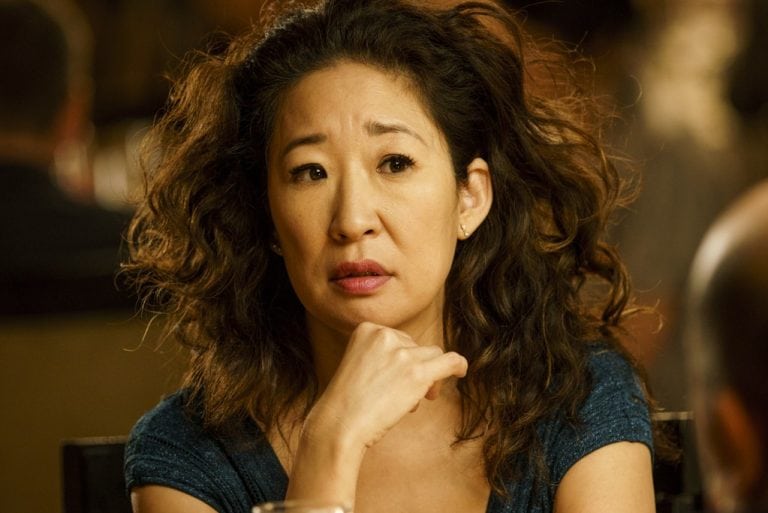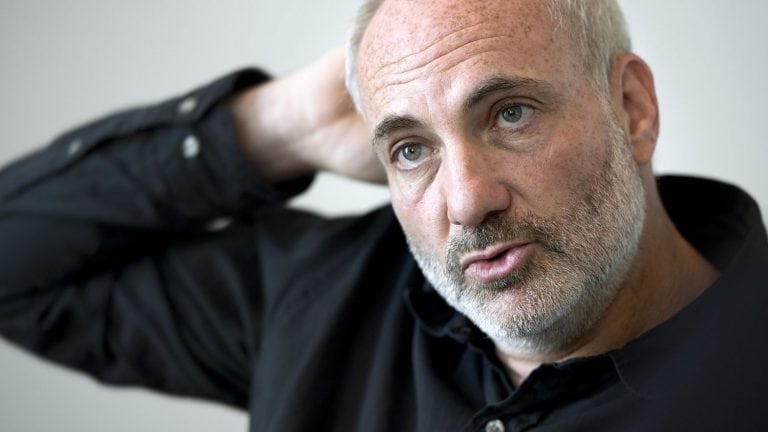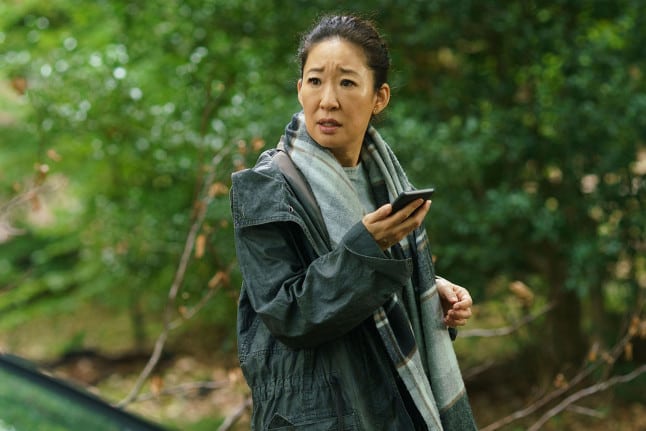By David Walsh

Sandra Ok as Eve. Ultimately an emotional mess and an enigma as much as the psychopathic killer. But it humanises the British CIA.
Killing Eve is a British-made television series broadcast on BBC America, based on the Codename Villanelle novella series by Luke Jennings. The first season had eight episodes. The series has been renewed for a second season.
Eve Polastri (Sandra Oh) is a bureaucrat working for MI5, the UK’s domestic intelligence agency. She becomes convinced the recent murder of a “sex-trafficking Russian politician” is the work of a female assassin, contrary to the views of her superiors. On her own time, Polastri has been attempting to connect a number of killings. After she disobeys her boss, Polastri—along with two colleagues—is fired.
However, Carolyn Martens (Fiona Shaw), the head of the Russian section of MI6, the British foreign intelligence service, recruits Polastri and the other two for an “off-the-books” operation to track down the killer.
Meanwhile, the assassin herself, “Villanelle,” real name Oksana Astankova (Jodie Comer), is informed by her handler, Konstantin (Kim Bodnia), a veteran Russian intelligence operative, of MI6’s interest in her. She immediately becomes obsessed with her pursuer, Polastri.
The series consists essentially of Polastri and team’s pursuit of Villanelle as she carries out her killing spree in various European countries (France, Germany, Bulgaria, Italy, England and perhaps more) and inside a Russian prison, a chase complicated by the fact that the prey on several occasions becomes the hunter.
The underlying motives behind the murders, of a politician, a gangster, a businesswoman, etc., are unclear (perhaps mere political destabilization and “chaos”), but a “shadowy organization,” The Twelve, seems to be ordering them. Villanelle herself, in response to a question from one of her victims, “Why are you doing this?,” tells him, “I have absolutely no idea.” She takes considerable pleasure in causing pain, mutilating and killing.
Eve becomes obsessed with Villanelle too, describing herself at one point as “a fan.” Even after the assassin kills her colleague, Bill (David Haig), in a Berlin disco, Polastri—along with everyone else—remains intrigued and slightly awe-struck.

Villanelle puts the knife to Eve. Murky motivations for a dazzling assassin. Only the propaganda husk remains.
Eve’s marriage suffers from the strains of her new and dangerous work. On several occasions she fights with her long-suffering husband, Niko (Owen McDonnell). She seems more interested in Villanelle than anything or anyone else.
Nearly everyone comes under suspicion. Carolyn has had some sort of personal relationship with Konstantin in the past, and may have a current agenda that is hidden from the others, including her son, Kenny (Sean Delaney), a hacker and a member of the secret team. On the other side, it is not clear to whom or what Konstantin is loyal.
While it does not appear that Russian intelligence is directing Villanelle’s homicidal campaign, a distinctly anti-Russian mood and ambiance pervades the series. It is simply one of the givens of this television program and many other programs and films at present, as it is for a particular international social layer, that Moscow is the source of a much of what is perverse, corrupt and evil in the world. One does not have to provide one’s criminals, torturers and assorted violent maniacs with an emotional or social background, it is enough to give them a Russian name and accent.

Kim Bodnia: Danish actor playing unlucky handler for Villanelle. In the series, though generally sympathetic, he’s still a Russian, hence morally compromised by definition.
We have returned to the days of the Cold War, or, in many ways, something considerably more primitive. After all, the writings of John le Carré (The Spy Who Came in from the Cold, Tinker Tailor Soldier Spy, etc.) and others helped undermine the propaganda of the “free world” to the effect that it was defending freedom and democracy. Grubbiness and cynical realpolitik were shown to prevail.
Killing Eve serves up a ridiculously Manichean view of the world. Everything Russian is sinister, cruel and bleak. All things British, even when treachery is afoot, are bright, chummy and amusing.
There is very little social or psychological realism or plausibility here. One doesn’t have the impression that the author of the novellas, Luke Jennings, or the creator of the series, Phoebe Waller-Bridge, have thought seriously about the geopolitical, social or emotional implications of any of the characters’ actions.
We are meant to accept on faith that Eve and Villanelle, involved in a “deadly cat-and-mouse game,” fascinate one another from the first moment each is aware of the other. But it’s never clear why that should be the case. The self-consciously “disturbing” effort to establish some sort of psycho-sexual bond between Eve and Villanelle (“You’d find we work for the same people”, “You like me too much …,” “I think about you all the time ….” “I think about you too …,” etc.) simply falls flat. The series asserts such a “dark” and intense bond, but never proves it dramatically or psychically.
Oh is pleasant enough, but her Polastri is hardly the stuff of obsession. She is rather ordinary and plodding.
 As for Villanelle-Oksana, Killing Eve indulges in the unpleasant romanticization and glamorization of “hitmen” (and women) and other murderers that seems to have come into particular vogue within the American and European upper middle class in the late 1980s and early 1990s. In other words, the interest in depicting and even idealizing killers emerged about the same time as the Great Powers, including the UK, launched the drive to recolonize major parts of the globe, expressed in such efforts as the US-led 1990-91 Gulf War. The infamous motto of the Wall Street Journal after that murderous, one-sided assault on Iraq, “Force works,” became that of a section of the movie- and television-making community.
As for Villanelle-Oksana, Killing Eve indulges in the unpleasant romanticization and glamorization of “hitmen” (and women) and other murderers that seems to have come into particular vogue within the American and European upper middle class in the late 1980s and early 1990s. In other words, the interest in depicting and even idealizing killers emerged about the same time as the Great Powers, including the UK, launched the drive to recolonize major parts of the globe, expressed in such efforts as the US-led 1990-91 Gulf War. The infamous motto of the Wall Street Journal after that murderous, one-sided assault on Iraq, “Force works,” became that of a section of the movie- and television-making community.
There is no reason to believe that hired killers, belonging among the most odious human types, are anything like Villanelle in Killing Eve. In any case, the producers and writers don’t have any idea what such people are like. They simply create a protagonist who corresponds to the empty-headed petty bourgeois delusion that “freedom” consists in being permitted to do anything, including murdering without a conscience. Comer is a talented performer, but nothing she does can bring to life what is a full-fledged fantasy.
Numerous reviewers express delight in the Villanelle/Oksana figure, who is, after all, a sadistic killer. Hannah Giorgis in the Atlantic first notes that after Villanelle murders, “she luxuriates in her Paris flat, collecting ornate trophies from her kills and draping herself in the finest fabrics. She is cocky, playful, and ostentatious. She stabs one elder statesman through the eye with her hairpin; she triggers a fatal asthma attack in one ‘breathy’ female target using poisoned perfume”—before adding, “yet she is nearly impossible to not root for.”
“Killing Eve is a funny, witty, bright show about a hilarious, soulless maniac who waxes people to pop music,” asserts Willa Paskin in Slate. Villanelle, she continues, is “twisted and conscienceless, but she is also irrepressible. She’s a proper psychopath; a little bloodshed isn’t gonna get her down! As written and performed, Villanelle is unsinkable, undeniable, drawing people in, even when they should be running away.”
Giorgis and Paskin should perhaps speak for themselves.
Inevitably, given the gender of the series’ two leading characters, Killing Eve has been labeled a “feminist thriller,” a “perfect show for the #MeToo era,” in the words of Salon ’s Melanie McFarland. “What’s been fascinating,” McFarland writes, “is to witness the ways that it explores the kind of trickiness involved in navigating the world as a woman, in ways that the #MeToo and Time’s Up movements are only starting to reckon with.” Etc., etc.
All in all, despite the presence of some talented performers, Killing Eve is a poor artistic effort, superficial, unconvincing and unenlightening.

This work is licensed under a Creative Commons Attribution-NonCommercial 4.0 International License
![]()
[premium_newsticker id=”154171″]
Things to ponder
While our media prostitutes, many Hollywood celebs, and politicians and opinion shapers make so much noise about the still to be demonstrated damage done by the Russkies to our nonexistent democracy, this is what the sanctimonious US government has done overseas just since the close of World War 2. And this is what we know about. Many other misdeeds are yet to be revealed or documented.
Parting shot—a word from the editors
The Best Definition of Donald Trump We Have Found
 In his zeal to prove to his antagonists in the War Party that he is as bloodthirsty as their champion, Hillary Clinton, and more manly than Barack Obama, Trump seems to have gone “play-crazy” — acting like an unpredictable maniac in order to terrorize the Russians into forcing some kind of dramatic concessions from their Syrian allies, or risk Armageddon.However, the “play-crazy” gambit can only work when the leader is, in real life, a disciplined and intelligent actor, who knows precisely what actual boundaries must not be crossed. That ain’t Donald Trump — a pitifully shallow and ill-disciplined man, emotionally handicapped by obscene privilege and cognitively crippled by white American chauvinism. By pushing Trump into a corner and demanding that he display his most bellicose self, or be ceaselessly mocked as a “puppet” and minion of Russia, a lesser power, the War Party and its media and clandestine services have created a perfect storm of mayhem that may consume us all.— Glen Ford, Editor in Chief, Black Agenda Report
In his zeal to prove to his antagonists in the War Party that he is as bloodthirsty as their champion, Hillary Clinton, and more manly than Barack Obama, Trump seems to have gone “play-crazy” — acting like an unpredictable maniac in order to terrorize the Russians into forcing some kind of dramatic concessions from their Syrian allies, or risk Armageddon.However, the “play-crazy” gambit can only work when the leader is, in real life, a disciplined and intelligent actor, who knows precisely what actual boundaries must not be crossed. That ain’t Donald Trump — a pitifully shallow and ill-disciplined man, emotionally handicapped by obscene privilege and cognitively crippled by white American chauvinism. By pushing Trump into a corner and demanding that he display his most bellicose self, or be ceaselessly mocked as a “puppet” and minion of Russia, a lesser power, the War Party and its media and clandestine services have created a perfect storm of mayhem that may consume us all.— Glen Ford, Editor in Chief, Black Agenda Report






I finally gave up hope post-Bill, but stuck with the show for the pay-off, the end. I got neither of those.
Both leads are a**holes to put it plainly. The only relief was Konstantin and (killed)Bill, and maybe the MI6 boss but, we can’t say, because the show wastes its entire focus on two a**holes. I accepted that, as a way to keep the others shrouded in mystery that I expected to be revealed. I was robbed!
A psycho murderer, a neurotic twit, and awesome Russians. It’s like the ’16 election all over again!
Such programming, from reading the review/article, sounds like psychological and spiritual poison, like so much other Western programs like House of Cards, Breaking Bad….frankly, I refuse to voluntarily poison myself. There is enough factual horror that such shows distract people from learning about. If only the BBC actually told the real truth of “Perfidious Albion” and its destructive partner countries.
Focus on the UK, zoom in to Salisbury… We’ve already had the Skripals poisoned by a “nerve agent” that, strangely enough featured as a deadly chemical in a TV series just prior to the event of their near demise (in the series a nerve agent, novichok, was used to dispatch one of the protagonists). Now we have a TV series featuring a deadly assassin, who is a psychopath and likes to see her victims suffer. Are we about to have the Metropolitan police reveal that they are hot on the trail of a Russian assassin who like to see her… Read more »